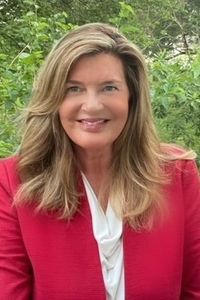Dawn Pulliam
Dawn Pulliam is a member of the Anne Arundel County Board of Education in Maryland, representing District 7. She assumed office on December 2, 2024. Her current term ends on December 4, 2028.
Pulliam ran for election to the Anne Arundel County Board of Education to represent District 7 in Maryland. She won in the general election on November 5, 2024.
Pulliam completed Ballotpedia's Candidate Connection survey in 2024. Click here to read the survey answers.
Biography
Dawn Pulliam was born in Cheverly, Maryland. She earned a bachelor's degree from the University of Maryland in 1997 and a graduate degree from the University of Maryland in 2007. Her career experience includes working as a program manager and working in academia, budget management, business development, and government industry relations. She has been affiliated with Anne Arundel County Farm Bureau, Bowie Elks Lodge #2309, and American Legion Post #131.[1]
Elections
2024
See also: Anne Arundel County Public Schools, Maryland, elections (2024)
General election
General election for Anne Arundel County Public Schools, District 7
Dawn Pulliam defeated Jeremy York and Maisie Howard in the general election for Anne Arundel County Public Schools, District 7 on November 5, 2024.
Candidate | % | Votes | ||
| ✔ |  | Dawn Pulliam (Nonpartisan)  | 56.8 | 23,158 |
 | Jeremy York (Nonpartisan) | 42.3 | 17,213 | |
 | Maisie Howard (Nonpartisan) (Write-in)  | 0.4 | 169 | |
| Other/Write-in votes | 0.5 | 197 | ||
| Total votes: 40,737 | ||||
 = candidate completed the Ballotpedia Candidate Connection survey. = candidate completed the Ballotpedia Candidate Connection survey. | ||||
| If you are a candidate and would like to tell readers and voters more about why they should vote for you, complete the Ballotpedia Candidate Connection Survey. | ||||
Do you want a spreadsheet of this type of data? Contact our sales team. | ||||
Nonpartisan primary election
The primary election was canceled. Dawn Pulliam and Jeremy York advanced from the primary for Anne Arundel County Public Schools, District 7.
Endorsements
Ballotpedia did not identify endorsements for Pulliam in this election.
Campaign themes
2024
Ballotpedia survey responses
See also: Ballotpedia's Candidate Connection
Dawn Pulliam completed Ballotpedia's Candidate Connection survey in 2024. The survey questions appear in bold and are followed by Pulliam's responses.
| Collapse all
I spent 23 years at the University of Maryland’s School of Public Policy, creating and leading programs that prepared students for future careers in government and industry. I then led the establishment of the Corporate Lockheed Martin Sustainment Institute (LMSI). Additionally, I served as the Lead for the Talent and Workforce Initiative for the Corporate Sustainment Council, where I developed the Sustainment Mid-Career Leadership Program, Corporate Recognition Program, career paths, and external university research partnerships.
Over the past year, I served as the Senior Program Manager, leading the development and execution of the congressionally mandated Defense Civilian Training Corps program for the Department of Defense. This program aims to create a ready workforce for the DoD civilian pipeline through a robust curriculum, hands-on learning experiences, and summer team projects that address real-world challenges in collaboration with military installations.
I am currently planning to develop a Technology Innovation Launch Pad Factory for youth in Anne Arundel County. I am also a Southern High Integrated Community Steering Team (ICST) member and mentor the Southern FFA leadership team.- AACPS must prioritize academic excellence, ensuring that the over 60% of students not at grade level in science and math receive the resources needed to get back on track. This can be achieved through traditional learning model that focuses on reading, writing, arithmetic, problem-solving, and critical thinking. Students can then reach their educational goals and access new opportunities. Teachers require modernized classrooms and resources to create productive and safe learning environments. Additionally, parents, caregivers, and key stakeholders must be actively engaged throughout each student’s educational journey.
- To ensure educators can perform effectively, we must cultivate a healthy, safe, and distraction-free learning environment. This atmosphere should promote student engagement and academic success, free from violence, weapons, bullying, drugs, and alcohol. Reducing distractions and disciplinary issues is essential for fostering success through prevention programs and increased parental and community engagement. Enforcing policies, laws, and codes of conduct is vital, along with providing rehabilitation, mentorship, and compassion for students. Restricting cell phone use during school hours is one strategy we must maintain, while also exploring new approaches to enhance the learning environment.
- Parents and caregivers are essential stakeholders in their children's health, well-being, and education. Currently, their ability to engage in their students' education faces unnecessary obstacles and skepticism. I will advocate for their right to know, understand, and actively participate in educational decisions. They should always be the first informed about health, safety, and learning matters involving their children. This is includes having full knowledge of changes in their children's gender identity. When educational materials conflict with their values and beliefs, parents should have the right to request alternative materials, ensuring their students are not excluded from essential skills while respecting their personal rights.
Board members establish the system's budget, adopt policies, approve curricula, and develop strategic goals. They hire and manage the Superintendent, oversee all employment negotiations, and make redistricting decisions.
Wonder Woman inspires and unites others, and I strive to engage parents, teachers, and the community in meaningful conversations about our schools. Collaboration is essential for overcoming challenges, and I want to cultivate that spirit in our educational system.
Her commitment to empowerment is especially important to me. I want every student’s voice to be heard, particularly those who may feel overlooked. All students deserve a safe and supportive environment where they can thrive.
Culturally Responsive Education
First, we must implement a curriculum that reflects diverse cultures and perspectives, ensuring all students see themselves represented. Professional development for educators on culturally responsive teaching will help them understand and address their students' varied backgrounds.
We must also consider:
Inclusive Support Services—Expanding access to mental health resources for students and staff is essential, as are specialized programs tailored for students with diverse learning needs, including those in special education and English language learning and those demonstrating uniquely high skill levels.
Engaging Families and Communities - Establishing clear communication channels with families, including translations and accessible resources, will encourage engagement. Collaborating with local organizations and businesses can provide mentorship and extracurricular opportunities that resonate with our community’s diversity.
Flexible Learning Environments - Utilizing personalized learning strategies and flexible environments will cater to various learning styles, ensuring every student can thrive. Additionally, leveraging technology will enhance accessibility and learning opportunities.
Feedback and Adaptation - Regular feedback from students, parents, and staff through surveys and forums will help identify needs and areas for improvement. This input will guide the continuous adaptation of programs and policies, ensuring they remain responsive to our community.
I propose expanding the CASE program into a magnet program. Agriculture contributes over 25% of our area’s GDP, yet we face a decline in farmers and available land. Agriculture is more than just tilling soil; it encompasses diverse careers that require Bachelor of Science degrees and technical skills, as well as a passion for feeding and supporting our communities.
Enhancing agricultural education can bridge educational disparities in rural areas, strengthen the relationship between the public and food producers, and promote a sustainable agricultural system. This education provides students with a holistic view of food production, food security, nutrition, and the environment. As modern agriculture becomes increasingly technology-driven, equipping students with the necessary skills is essential.
Smaller student-to-teacher ratios would allow educators more time for planning, grading, and providing one-on-one support for students facing challenges. Every student in need would receive the assistance they require.
Moving forward, we must better prepare for large-scale emergencies. We should publicly review with students, staff, and community experts what we did well and what we could improve. Unlike other districts, ours conducted a timely post-event analysis and shared it with stakeholders to enhance our response for the future. Ongoing exchanges of best practices with both public and private schools are essential.
Instead of closing schools, we could enhance safety measures and support for families, particularly those with fewer resources. Keeping schools open helps students maintain educational progress and provides critical social interaction, reducing feelings of isolation. Districts that quickly returned to in-person learning experienced better recovery outcomes, while our students faced significant learning loss.
Schools offer a structured routine that helps children feel secure and focused, especially during uncertain times. Many students rely on schools for meals and essential services. Keeping schools open also supports working parents by ensuring their children are in a safe environment.
Additionally, I will actively participate, strengthen current communication channels (social media, emails, etc.), and ensure an open-door policy.
The teacher shortage is a national concern, and it poses specific challenges for Anne Arundel County due to our area’s high cost of living.
I will support initiatives that promote open forums and community engagement, allowing parents and residents to ask questions and provide feedback on policy, financial, and enterprise-level operational decisions. It’s crucial that the Board operates with integrity and responds to the community's needs, ensuring that every dollar spent directly benefits our students and schools.
Note: Ballotpedia reserves the right to edit Candidate Connection survey responses. Any edits made by Ballotpedia will be clearly marked with [brackets] for the public. If the candidate disagrees with an edit, he or she may request the full removal of the survey response from Ballotpedia.org. Ballotpedia does not edit or correct typographical errors unless the candidate's campaign requests it.
See also
2024 Elections
External links
|
Candidate Anne Arundel County Public Schools, District 7 |
Personal |
Footnotes
- ↑ Information submitted to Ballotpedia through the Candidate Connection survey on September 24, 2024








